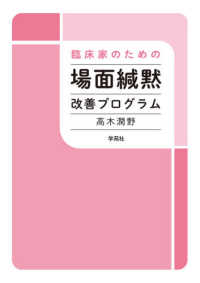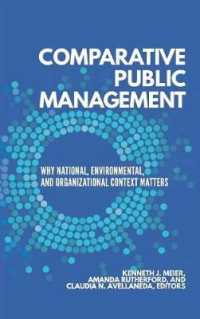Full Description
Interest in knowledge integration grew considerably in recent years, particularly within the realm of pre-service teacher education. However, studies on the topic conceptualize knowledge integration in diverse ways. For example, it may be conceived as a specific coherence-building learning process which involves not only acquiring but interrelating knowledge of different types (e.g., theoretical and practical) or from different domains, which together constitute a teacher's or educational specialist's professional knowledge base (e.g., content knowledge, pedagogical knowledge, pedagogical content knowledge, knowledge about using technologies for learning and instruction, etc.). Furthermore, knowledge integration also refers to the meaningful application of knowledge of different types and from various domains in order to act professionally and to teach successfully.
In many countries, however, future teachers and educational specialists often struggle with knowledge integration, because the task of integrating knowledge across domains, from various courses, and from practical training is left largely to the individuals. Thus, the efficacy and quality of higher education programs, particularly in pre-service teacher education, could be improved through careful attention to knowledge integration.
International Perspectives on Knowledge Integration aims at facilitating the consideration of knowledge integration in teacher training and higher education in both research and practice. Specifically, it explores theoretical conceptions and methods, and reports on original research and good practices for fostering knowledge integration. It is thus of interest to researchers, faculty board members, and lecturers concerned with teacher training and higher education, as well as to student-teachers and students of pedagogy, education, and educational psychology.
Contents
List of Figures and Tables
Notes on Contributors
Introduction
Thomas Lehmann
Part 1: Theoretical Conceptions Linking Knowledge Integration and Professional Development
1. What Is Knowledge Integration of Multiple Domains and How Does It Relate to Teachers' Professional Competence?
Thomas Lehmann
2. Conceptualizing (Pre-Service) Teachers' Professional Knowledge for Complex Domains
Karsten Krauskopf, Carmen Zahn and Friedrich W. Hesse
3. Searching for the Key to Knowledge Integration
David D. Barker, Matthew S. Winsor, J. Vince Kirwan and Theodore J. Rupnow
4. Fostering Professionalism and Scientificity through Integration of Disciplinary and Research Knowledge
Katrin Klieme, Thomas Lehmann and Florian Schmidt-Borcherding
Part 2: Methodological Contributions and Instruments for Assessing Knowledge Integration
5. PRocesses of Knowledge Integration between Realms of Pedagogical Content Knowledge and How to Capture Them
Anita Stender and Maja Brückmann
6. Knowledge and Structure to Teach
Pablo Pirnay-Dummer
7. Separative and Integrative Learning in Teacher Education
Thomas Lehmann, Katrin Klieme and Florian Schmidt-Borcherding
Part 3: Research on Knowledge Integration
8. Pedagogical and Psychological Content in Teacher Education
Hendrik Lohse-Bossenz, Andrea Westphal and Miriam Vock
9. Using Relevance Instructions to Support the Integration of Teacher Knowledge
Helene Zeeb, Eileen Spitzmesser, Alisa Röddiger, Timo Leuders and Alexander Renkl
10. Closing the Gap
Hans-Peter Gottein
11. Adaptive Cycles of Teaching
Diane Salmon, Eun Kyung Ko, Ruth Freedman and Jill Zifkin
12. Coherence within Teacher Education
Jonathan Lilliedahl, Tom Wikman and Sven-Erik Hansén
13. Effects of Game-Based Learning in Teams on Knowledge Integration
Norbert M. Seel
Part 4: Good Practices for Fostering Knowledge Integration in Pre-Service Teacher Education
14. Promoting Knowledge Integration in Teacher Education Programs
Matthew S. Winsor, David D. Barker and J. Vince Kirwan
15. The Linkage of Research and Writing Competence in Teacher Education
Sandra Moroni and Gisela Bürki
16. Teacher Educators and Pre-Service Teachers Work towards Knowledge Integration
Ruth Reynolds, Suzanne Macqueen and Kate Ferguson-Patrick
Index







